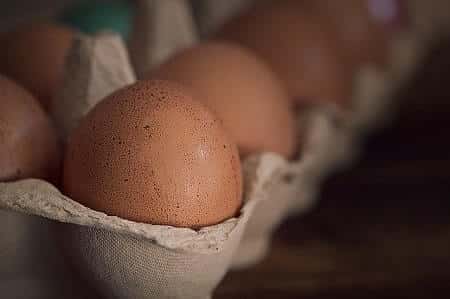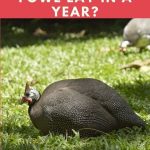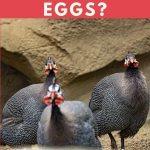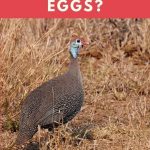Those little fluffy, adorable, cute, fluffy baby Guinea Fowl are called “Keets”. This is where Guinea fowls and chickens differ, the adult names are the same, but the babies are not chicks, they’re keets.
Table of Contents
What Is a Group of Guinea Fowl Called?
Another fun fact to impress your friends with - a group of Guinea fowl is called a “confusion”.
Not a flock as most people assume as that’s what a group of chickens is called. I don’t know the origin of this word being used for a group of these birds, but it makes perfect sense!
In the wild, they commonly hang around in groups as large as 30. They will follow herds of larger animals and feed off scraps they leave behind and help out by eating ticks and insects off of them.
Do Guinea Fowl Make Good Backyard Pets?
Yes, absolutely they do.
They are very different from chickens in some ways though, despite being a close relative and looking similar.
Guinea fowl tend to be raised for meat more so than kept as backyard pets. The main reason for this is because they don’t lay as many eggs as chickens, and their meat is tender and a bit more “gamey” than chicken.
Helmeted Guinea in particular has become well adapted to being raised in backyards and urban settings. Although, they are much louder than chickens, so they’re not always welcome in urban settings.
Some Benefits of Raising Keets or Keeping Guinea Fowl
Raising baby animals of any kind is incredibly fun and rewarding, and this is certainly true with keets.
They’re not hard to raise, and Guineas in general are hardy, largely self-sufficient birds. Most of your input will be providing food and water, and simply enjoying watching them grow up.
As Guineas grow up, the main benefits of having these curious balls of feathers in your yard include:
They Feed on Insects and Bugs
Chickens are natural foragers and will chase down most things that crawl or fly, but Guineas will feed on everything that chickens won’t - some of which is good for your yard.
When it comes to food, they are pretty much self-sufficient if they have enough room to roam. They’ll eat just about anything that moves - or doesn’t move.
The best part is that they eat ticks, fleas, and other annoying pests that can cause problems for chickens. Plus, they don’t scratch hard or dig for worms and underground bugs.
So, they’re less destructive than chickens, eat the insects they don’t and won’t cost you as much to feed. I’m not trying to make Guinea sound better than chickens, but those are all healthy pros.
Their Eggs Are Delicious

There are often debates about whether or not it’s worth keeping Guineas for their eggs. They lay fewer eggs than chickens throughout the year, and their eggs are smaller.
But in my opinion, they’re tastier, so that means it’s always worthwhile.
It’s hard to describe the taste. It’s not that different from a chicken’s egg, but there is a subtle difference.
The best way I can explain the taste is as more “gamey”. I’ve not actually tried the meat, but I’m told that it tastes more gamey, so it makes sense.
Added Security
You can look at this as either a huge pro or a huge con, but Guineas make a lot of noise. This can be a good thing if they spot a predator, or it can be a bad thing if you have neighbors or a small yard.
It’s not like having one rooster, which you can find a way of dealing with the noise becomes a problem.
Read these posts on how you can separate a rooster or use a no crow collar to quieten them.
A whole confusion of Guineas makes a heck of a lot of noise when they feel like it. This, combined with their need to forage for land bugs is why it’s recommended you have a large outdoor space for them.
It's Fun and Rewarding
If you enjoy watching and interacting with backyard chickens, you’ll love having some Guineas!
Although the pearl grey with white spots is the most common color, they’re actually available in a wide range of beautiful and exotic colors.
They have some awesome individual personalities too. Which, while we’re on the topic, I have to point out that how well they’re socialized as keets has a huge impact on their friendliness as adults.
Where to Buy Guinea Keets Online?
If you’ve read this far I should have convinced you by now that you need some keets, right?
Well, it’s up to you - no pressure!
I can point you in the direction of where to buy keet from reputable online hatcheries though. I recommend checking out:
Cackle Hatchery - At the time of writing this they had White African, Lavender, Royal Purple, and Pearl Grey Guineas. They start at around $5/ea too, so very reasonable.
McMurray Hatchery - McMurray currently has a wide range of Guineas. They even have some rare exotic varieties like the Vulturine Guinea Fowl. A stunning looking bird, but they have a hefty price tag of around $750.
Wrapping Up
Whether you’re homesteading or a backyard enthusiast looking to add some different species to your tribe, Guineas are awesome pets for a number of reasons as I’ve discussed.
You now know the terminology, what baby Guinea fowl are called, and where to buy them online. I’ll leave the rest up to you.
Resources
Image credits - Header image by grantspong, egg image by Pezibear from Pixabay




